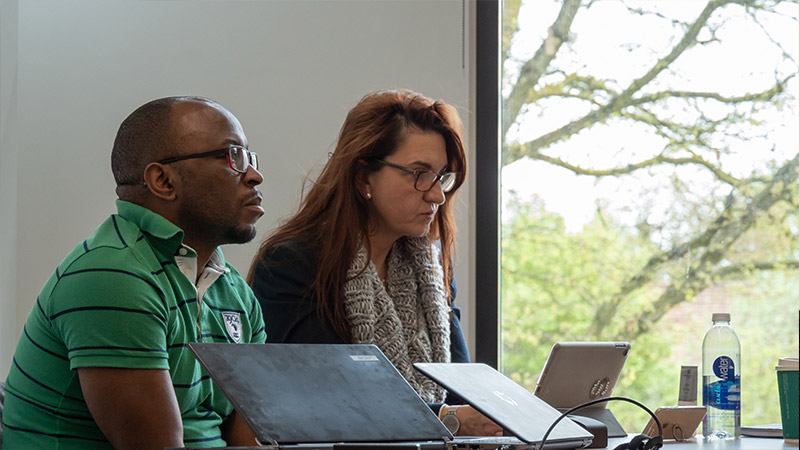Data Science and Artificial Intelligence
MSc
Overview
The MSc in Data Science and Artificial Intelligence provides you with the skills and understanding necessary to gather, identify, process, analyse and use data using AI techniques. You will learn fundamental theory and practise concepts that will equip you with the professional skills needed in the workplace.
The explosion and wealth of available data in a wide range of application domains gives rise to new challenges and opportunities in all areas. One challenge is how to use this unprecedented scale of data, and how to gain further insights and knowledge to improve the quality of offered products and services. Artificial Intelligence plays a central role in understanding data and developing intelligent systems that can learn from themselves and assist organisations in strategic decision making.

Why Oxford Brookes University?
-
Use of real case scenarios
Many assignments will be based on big data sets based on real case scenario to solve real world problems. You will also have the opportunity to use data from your workplace.
-
Combine the pillar of data science
You will use Mathematics, Programming and AI techniques to gather, model, transform, process and analyse data.
-
Extra curriculum: Autonomous vehicles
The autonomous vehicle team from OBR requires students with skills in data analysis and AI to work on software for the car, giving you valuable experience.
-
New State-of-the-art facilities
All Computing courses are based in new, custom designed buildings at our main Headington site. You'll benefit from state-of-the-art facilities and equipment including a VR cave, digital, computing and robotics labs, as well as social learning spaces, teaching rooms and cafe space.
Course details
Study modules
Please note: As our courses are reviewed regularly as part of our quality assurance framework, the modules you can choose from may vary from those shown here. The structure of the course may also mean some modules are not available to you.
Research
The School of Engineering, Computing and Mathematics is home to world-leading and award-winning research.
Our focus is on user-inspired original research with real-world applications. We have a wide range of activities from model-driven system design and empirical software engineering through to web technologies, cloud computing and big data, digital forensics and computer vision.
Staff and students collaborate on projects supported by the EPSRC, the EU, the DTI, and several major UK companies.
Computing achieved an excellent assessment of its UoA (Unit of Assessment) 11 return for REF 2014 (Research Excellence Framework).
Students on this course can be involved with research in the following research groups:
Careers
Jobs around data science and AI (data scientist, data analytics, data engineer, data manager) have become increasingly important over the last decade. This is because data science holds the key to tackling the fundamental problem created by the revolution in the development of computers and automated systems in the 20th Century: how to make sense of the unprecedented volumes of data that are generated daily?
Currently, global demand for combined statistical and computing expertise outstrips supply, with evidence-based predictions suggesting a major shortage in this area for at least the next 10 years. For graduates in data science and AI this shortage presents opportunities to enhance career progression in one of the most crucial areas of modern science.
Graduates from the programme will be ideally equipped for a career in a wide variety of industries. Graduates are employed across a whole range of jobs including Data Scientists, Data Analyst, Statisticians and Data Engineers.
Entry requirements
Specific entry requirements
To join this course you'll need a 2:2 bachelor's degree in the physical or social sciences where you have developed analytical knowledge and understanding in mathematical sciences.
Typically this includes applicants with knowledge and familiarity with basic computing, mathematics and statistics concepts and methods at bachelor's degree level.
Applicants with other qualifications, plus work experience from other fields, who have quantitative skills and familiarity with data analysis and modelling ideas will also be considered.
Please also see the University's general entry requirements.
English language requirements
If your first language is not English you will require a minimum IELTS score of 6.0 overall with 6.0 in all components.
Please also see the University's standard English language requirements.
Pathways courses for international and EU students
We offer a range of courses to help you meet the entry requirements for your postgraduate course and also familiarise you with university life in the UK.
Take a Pre-Master's course to develop your subject knowledge, study skills and academic language level in preparation for your master's course.
If you need to improve your English language, we offer pre-sessional English language courses to help you meet the English language requirements of your chosen master’s course.
English requirements for visas
If you need a student visa to enter the UK you will need to meet the UK Visas and Immigration minimum language requirements as well as the University's requirements. Find out more about English language requirements.
Credit transfer
Terms and conditions of enrolment
When you accept our offer, you agree to the Terms and Conditions of Enrolment. You should therefore read those conditions before accepting the offer.
International qualifications and equivalences
How to apply
Application process
Tuition fees
Questions about fees?
Contact Student Finance on:
Tuition fees
The following factors will be taken into account by the University when it is setting the annual fees: inflationary measures such as the retail price indices, projected increases in University costs, changes in the level of funding received from Government sources, admissions statistics and access considerations including the availability of student support.
How and when to pay
Tuition fee instalments for the semester are due by the Monday of week 1 of each semester. Students are not liable for full fees for that semester if they leave before week 4. If the leaving date is after week 4, full fees for the semester are payable.
- For information on payment methods please see our Make a Payment page.
- For information about refunds please visit our Refund policy page
Additional costs
Please be aware that some courses will involve some additional costs that are not covered by your fees. Specific additional costs for this course are detailed below.
Optional costs
| Additional costs | Amount (£) |
|---|---|
| Travel and associated costs if relevant when undertaking work placements. | £30-700 per year |
If you are considering bringing your own computer, most of the software we use is on Windows machines though there is some use of Linux. We do not use Apple MacOS and their use is not required but some students do choose to bring MacOS machines so a Mac can be a viable choice if you so wish.
|
£500-1200 |
It’s your responsibility to cover print / binding costs where coursework submission is required. Please note that a lot of the coursework is now submitted online. |
From £30 |
| You may choose to purchase books to support your studies. Many books on our reading lists are available via the Library, or can be purchased secondhand. | £20-60 per book |
Accommodation fees in Brookes Letting (most do not include bills) |
£107-301 per week |
Accommodation fees in university halls (bills included, excluding laundry costs) |
£139-248 per week |
Graduation costs include tickets, gowning and photography. Gowns are not compulsory but typically students do hire robes, starting at £41. |
Typically £0-200 |
Students are responsible for their own travel to and from university for classes. For the 2025/26 academic year, the University is introducing an alternative subsidised travel offer for all students with further information on our Travel webpages. |
From £10 |
Funding your studies
Financial support and scholarships
Featured funding opportunities available for this course.
All financial support and scholarships
Programme changes:
On rare occasions we may need to make changes to our course programmes after they have been
published on the website. For more information, please visit our
changes to programmes page.

